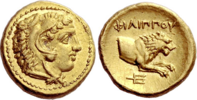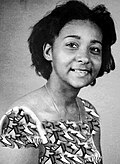From today's featured article
The government of ancient Macedonia was first established sometime during the 8th–5th centuries BC. Little is known of its institutions before the reign of Philip II (depicted), from 359 to 336 BC. Administration evolved in complexity under his successor Alexander the Great and subsequent dynasties. It is unclear if a constitution was formally established. The king (basileus) served as the head of state, assisted by his noble companions and royal pages. Kings served as chief judges and high priests of the nation, using their wealth to sponsor religious cults and to fund the armed forces. They controlled the exploitation of gold and timber. The right to mint coins was shared by the central and some local governments. The kings were the commanders-in-chief of the armed forces and commonly led their troops into battle. The ancient Macedonian army held some of the functions of a popular assembly and had some authority over the royal succession. In 167 BC the Macedonian monarchy was abolished and replaced by four Roman client states. (Full article...)
Did you know ...
- ... that despite her physical disability, Sara Gadalla Gubara (pictured) came third in a 50 km (31 mi) mixed-sex national swimming event in 1972?
- ... that the nadiri, a sleeveless overcoat, was personally designed by Jahangir, the fourth Mughal emperor?
- ... that singer Barbara Mandrell thought that when she saw Maureen McCormick play her in her biographical film, "all [she was] going to be able to think about is Marcia Brady"?
- ... that Soeparno moved the official year of establishment of Surabaya, Indonesia, from 1906 to 1293?
- ... that the acorn worm Balanoglossus gigas gives a strong iodoform-like smell when handled, possibly to ward off predators?
- ... that the musicians piri, venbee, Issey Cross, and Charlotte Plank are all part of the female and non-binary collective Loud LDN?
- ... that the New York Savings Bank Building later became "The Grand Palais of Rugs" and the "Temple of Food"?
- ... that before assassinating Umberto I of Italy, Gaetano Bresci spent most of the day eating ice cream?
In the news
- King Charles III and Queen Camilla (both pictured) are crowned at Westminster Abbey in London.
- In horse racing, Mage wins the Kentucky Derby.
- The World Health Organization ends its designation of the COVID-19 pandemic as a global health emergency.
- Nineteen people are killed in two separate shootings in Belgrade, Serbia, at an elementary school and nearby.
On this day
May 9: Europe Day in the European Union; Liberation Day in the Channel Islands (1945)
- 1877 – An earthquake struck northern Chile, leading to the deaths of 2,385 people, mostly victims of the ensuing tsunami, as far away as Hawaii and Fiji.
- 1944 – World War II: The Japanese Take Ichi convoy arrived at Halmahera in the Dutch East Indies after losing many ships and thousands of troops to Allied attacks while attempting to carry two divisions of troops from China to New Guinea.
- 1977 – The Hotel Polen in Amsterdam was destroyed by fire (pictured), leaving 33 people dead.
- 1980 – Part of the Sunshine Skyway Bridge in Florida collapsed after a pier was struck by the MV Summit Venture, killing 35 people.
- 2001 – Police at the Ohene Djan Stadium in Accra, Ghana, fired tear gas to quell unrest at a football match, leading to a stampede that killed 126 people.
- Al-Adid (b. 1151)
- John Dalrymple, 2nd Earl of Stair (d. 1747)
- Yukiya Amano (b. 1947)
Today's featured picture

|
La Fuensanta is a portrait painting by Spanish artist Julio Romero de Torres depicting Maria Teresa López González, one of his models. The painting was made in the autumn of 1929, when Torres completed another two artworks, La Chiquita Piconera and Bodegas Cruz Conde. González was one of Torres's favourite models, having first sat for him at the age of fourteen. According to Sotheby's, the work has been "proclaimed as a quintessential rendition of Andalucian beauty", and it was depicted for 25 years on the 100 peseta banknote. The work was exhibited at the Ibero-American Exposition in Seville in 1930, and is now in a private collection. Painting credit: Julio Romero de Torres
Recently featured:
|
Other areas of Wikipedia
- Community portal – The central hub for editors, with resources, links, tasks, and announcements.
- Village pump – Forum for discussions about Wikipedia itself, including policies and technical issues.
- Site news – Sources of news about Wikipedia and the broader Wikimedia movement.
- Teahouse – Ask basic questions about using or editing Wikipedia.
- Help desk – Ask questions about using or editing Wikipedia.
- Reference desk – Ask research questions about encyclopedic topics.
- Content portals – A unique way to navigate the encyclopedia.
Wikipedia's sister projects
Wikipedia is written by volunteer editors and hosted by the Wikimedia Foundation, a non-profit organization that also hosts a range of other volunteer projects:
-
Commons
Free media repository -
MediaWiki
Wiki software development -
Meta-Wiki
Wikimedia project coordination -
Wikibooks
Free textbooks and manuals -
Wikidata
Free knowledge base -
Wikinews
Free-content news -
Wikiquote
Collection of quotations -
Wikisource
Free-content library -
Wikispecies
Directory of species -
Wikiversity
Free learning tools -
Wikivoyage
Free travel guide -
Wiktionary
Dictionary and thesaurus
Wikipedia languages
This Wikipedia is written in English. Many other Wikipedias are available; some of the largest are listed below.
-
1,000,000+ articles
-
250,000+ articles
-
50,000+ articles



